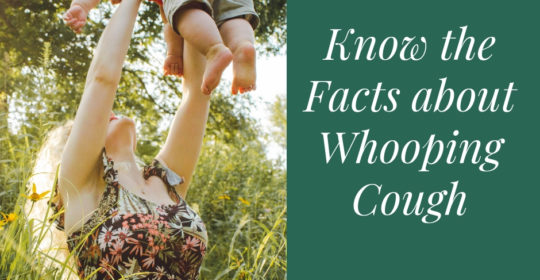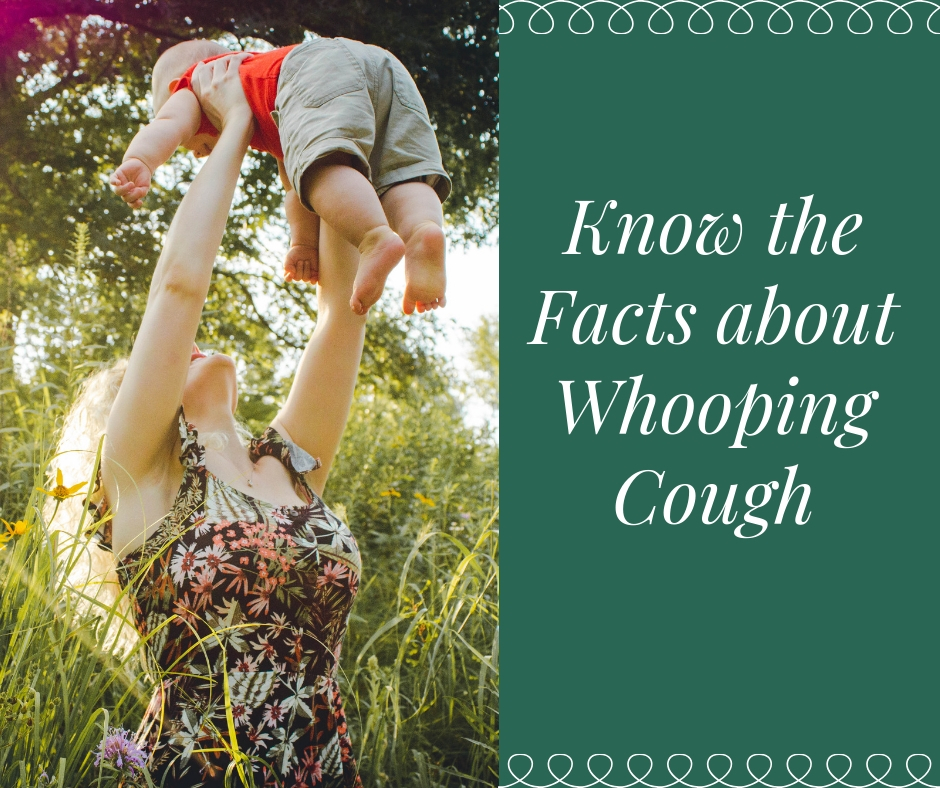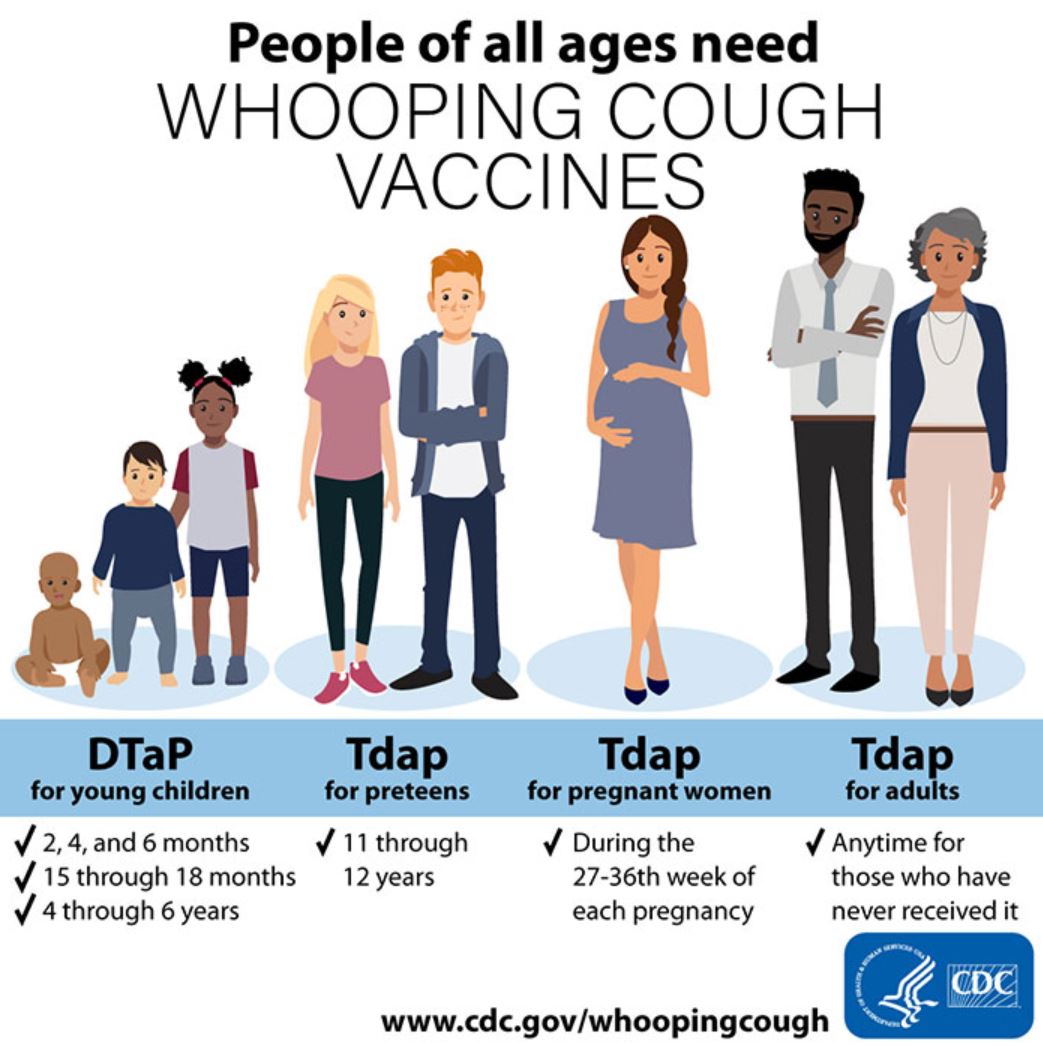
Know the facts about whooping cough

Whooping cough, or pertussis, is a highly contagious respiratory disease. It is caused by the bacterium Bordetella pertussis. Pertussis is known for uncontrollable, violent coughing which often makes it hard to breathe. After cough fits, someone with pertussis often needs to take deep breaths, which result in a “whooping” sound. Pertussis can affect people of all ages, but can be very serious, even deadly, for babies less than a year old. The best way to protect against pertussis is by getting vaccinated.
Fast Facts
-
-
- Pertussis is also known as “whooping cough” because of the “whooping” sound that someone makes when gasping for air after a fit of coughing.
- Coughing fits due to pertussis infection can last for up to 10 weeks or more; some people know this disease as the “100 day cough.”
- Pertussis can cause serious illness in people of all ages and can even be life-threatening, especially in babies.
- Approximately half of babies less than 1 year old who get pertussis need treatment in the hospital.
- The most effective way to prevent pertussis is through vaccination with DTaP for babies and children and with Tdap for preteens, teens, and adults.
- Vaccination of pregnant women with Tdap is especially important to help protect babies.
- Vaccinated children and adults can become infected with and spread pertussis; however, disease is typically much less serious in vaccinated people.
- Clinicians generally treat pertussis with antibiotics, which are used to control symptoms and to prevent infected people from spreading the disease.
- Worldwide, there are an estimated 24.1 million cases of pertussis and about 160,700 deaths per year, according to a recent publication modeling these data.
- In 2012, the most recent peak year, CDC reported 48,277 cases of pertussis in the United States, but many more go undiagnosed and unreported. This is the largest number of cases reported in the United States since 1955 when public health experts reported 62,786 cases.
- Since the 1980’s, there has been an increase in the number of reported cases of pertussis in the United States. In 2010, CDC saw an increase in reported cases among 7 through 10 year old. Similar trends occurred in the following years; however, CDC also observed an increase in cases among teens.
-
Whooping Cough Vaccination
CDC Recommends Whooping Cough Vaccines for People of All Ages, There are two vaccines in the United States that help prevent whooping cough: DTaP and Tdap. These vaccines also provide protection against tetanus and diphtheria. Children younger than 7 years old get DTaP, while older children, teens, and adults get Tdap.
Whooping Cough Vaccines Are Safe, most people who get a whooping cough vaccine do not have any serious problems with it. However, side effects can occur. Most side effects are mild, meaning they do not affect daily activities. See the DTaP and Tdap vaccine information statements to learn more about the most common side effects.
The vaccine recommended for someone depends on their age. The graphic below gives information, by age, about CDC’s whooping cough vaccine recommendations.

Who Should Not Get These Vaccines?
Because of age or health conditions, some people should not get certain vaccines or should wait before getting them. Read the guidelines below and ask your or your child’s healthcare professional for more information.
DT
Tell the person who is giving your child DT if:
Your child has had a life-threatening allergic reaction or has a severe allergy.
- Any child who had a life-threatening allergic reaction after a dose of DT should not get another dose.
- Any child with a severe allergy to any component of DT should not get this vaccine. Your child’s healthcare professional can tell you about the vaccine’s ingredients.
A healthcare professional has diagnosed your child with specific illnesses or conditions.
- Talk with your child’s healthcare professional if your child:
- Has seizures or another nervous system problem.
- Had severe pain or swelling after any vaccine containing tetanus or diphtheria.
- Ever had a condition called Guillian-Barré Syndrome.
Your child is not feeling well.
- If your child has a mild illness, such as a cold, they can probably get the vaccine. If your child has a more serious illness, they should probably wait until they recover. Your child’s healthcare professional can advise you.
Your child is 7 years or older.
- Healthcare professionals should not give DT to anyone 7 years or older. Talk to your child’s healthcare professional about how your child can catch-up on their immunization schedule.
DTaP
Tell the person who is giving your child DTaP if:
Your child has had a life-threatening allergic reaction.
- Any child who had a life-threatening allergic reaction after a dose of DTaP should not get another dose.
A healthcare professional has diagnosed your child with specific illnesses or conditions.
- Any child who suffered a brain or nervous system disease within 7 days after a dose of DTaP not attributable to another cause should not get another dose.
- Talk with the healthcare professional if your child:
- Had severe pain or swelling after any vaccine containing tetanus or diphtheria.
- Ever had a condition called Guillian-Barré Syndrome.
- Some of the following children should not get another dose of DTaP, but may get DT. Talk with your child’s healthcare professional if your child:
- Had a seizure or collapsed after a dose of DTaP.
- Cried non-stop for three hours or more after a dose of DTaP.
- Had a fever over 105°F after a dose of DTaP.
Your child is not feeling well.
- If your child has a mild illness, such as a cold, they can probably get the vaccine. If your child has a more serious illness, they should probably wait until they recover. Your child’s healthcare professional can advise you.
Your child is 7 years or older.
- Healthcare professionals should not give DTaP to anyone 7 years or older. Talk to your child’s healthcare professional about how your child can catch-up on their immunization schedule.
Td
Tell the person who is giving you or your child Td if:
You or your child have had a life-threatening allergic reaction or have a severe allergy.
- Anyone who has had a life-threatening allergic reaction to a dose of this vaccine or to any tetanus- or diphtheria toxoid-containing vaccine should not get this vaccine.
- Anyone with a severe allergy to any component of Td should not get this vaccine. Your or your child’s healthcare professional can tell you about the vaccine’s ingredients.
You or your child have had a previous reaction to similar vaccines or a healthcare professional has diagnosed you or your child with specific illnesses or conditions.
- Talk with the healthcare professional if you or your child:
- Had severe pain or swelling after any vaccine containing tetanus or diphtheria.
- Ever had a condition called Guillian-Barré Syndrome.
You or your child are not feeling well.
- People who have a mild illness, such as a cold, can probably get the vaccine. People who have a more serious illness should probably wait until they recover. Your or your child’s healthcare professional can advise you.
Your child is younger than 7 years old.
- Healthcare professionals should not give Td to anyone younger than 7 years old.
Tdap
Tell the person who is giving you or your child Tdap if:
You or your child have had a life-threatening allergic reaction or have a severe allergy.
- Anyone who has had a life-threatening allergic reaction to a dose of this vaccine or to any diphtheria toxoid-, tetanus toxoid-, or whooping cough-containing vaccine should not get this vaccine.
- Anyone with a severe allergy to any component of Tdap should not get this vaccine. Your or your child’s healthcare professional can tell you about the vaccine’s ingredients.
You or your child have had a previous reaction to similar vaccines.
- Anyone who had coma or long repeated seizures within seven days after a childhood dose of DTP or DTaP, or a previous dose of Tdap, should not get Tdap, unless a cause other than the vaccine was found. They can still get Td.
- Talk with your or your child’s healthcare professional if you:
- Have seizures or another nervous system problem.
- Had severe pain or swelling after any vaccine containing tetanus, diphtheria, or whooping cough.
- Ever had a condition called Guillian-Barré Syndrome.
You or your child are not feeling well.
- People who have a mild illness, such as a cold, can probably get the vaccine. People who have a more serious illness should probably wait until they recover. Your or your child’s healthcare professional can advise you.
Your child is younger than 7 years old.
- Healthcare professionals should not give Tdap to anyone younger than 7 years old.


Most Commented